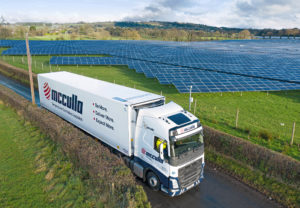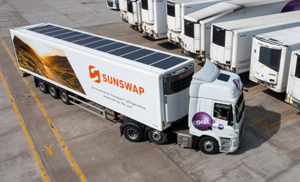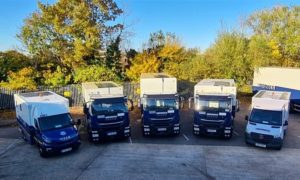Solar panels mounted on trucks, vans and trailers are showing potential for operators looking to squeeze efficiencies from their vehicles and gain power from them with cleaner electricity.
Some companies with an eye on saving money and cutting emissions are now making the switch to electric transport augmented by solar power due to reductions in carbon dioxide emissions and reported fuel consumption savings.

Manufactured by County Antrim-based Genie Insights, the photovoltaic (PV) panels use thin film solar cell technology known as copper indium gallium selenide, which results in a more robust and flexible product that is better suited for vehicles than traditional glass solar panels.
These PV panels keep fridge batteries topped up to avoid breakdowns and prolong the life of vehicle batteries, available in custom sizes to meet each operator’s individual needs.
Brian Beattie, Operations Director at McCulla, said: “We have made a strong commitment to the environment and the arrival of these new trailers with the latest technology from Schmitz Cargobull, Carrier and Genie Insights represents a further important step in the reduction of our carbon footprint.
“Crucially, the solar panels prolong battery life and improve battery reliability, so they also save us downtime and money.”
Meanwhile, logistics specialist Gist has partnered with engineering firm Sunswap to trial a zero-emission, solar and battery powered transport refrigeration unit (TRU) in its temperature-controlled distribution fleet based in Chesterfield.
Sunswap utilises energy prediction software with adaptive battery capacity and a solar energy recovery system.
Dependent on weather conditions, Sunswap says the solar panels on the Endurance TRU can provide 65 to 80 per cent of the charge needed throughout the year to operate the refrigeration unit, considerably reducing the time and cost of charging.
The Endurance is also able to operate at 10 per cent of the running costs compared with a diesel-powered TRU.
“Gist is actively collaborating within the industry to understand new, developing technology that can minimise our impact on the environment,” said Gist’s Director of Communications and Sustainability, Kate Brown.

Precious metals, diamonds and jewellery logistics specialist Brink’s has put into operation 36 vehicles equipped with solar panels from Trailar.
The solar panels are projected to save 580 litres of fuel and reduce 1.5 metric tonnes of CO2 emissions per vehicle each year.
For Brink’s, solar panels provide energy to help run vehicle systems including radios, heating and air conditioning, navigation, cameras, locks, alarms and truck lifts.
They come with Trailars’s Smart Charge Controller system, which also provides data such as vehicle battery levels, real-time fuel savings and carbon emissions.
“This technology will actively reduce fitted vehicles fuel and emissions, as the solar energy is utilised to power all onboard electrical equipment,” said Phil Wright, Director Operations and Security at Brinks.
“Not only is it tackling vehicle emissions, but the solar panels will constantly be managing the vehicles’ batteries, ensuring that they’re charged to the optimal level, even when not in use.
“This will ensure our operational readiness and enhance our service levels.”
The company has also created a team to pilot and oversee the program, who will provide guidance on when and how to potentially expand it across the company.
Wright added: “We know our fleet creates our company’s largest environmental impact, which is why solar panels are just the newest way we are addressing this important issue.”
Some of the major vehicle manufacturers are also looking at the potential of solar power for their own in-house vehicle and bodywork ranges.
As part of a research partnership including Uppsala University, Scania has been trialling a solar cell clad trailer to power a plug-in hybrid truck.
Swedish haulier Ernst Express has piloted the 18-metre long solar cell clad trailer with a total area of 140 square metres, including the sides and roof.
The project is also examining whether the trailer can feed electricity into the grid when the batteries are fully charged and the truck is parked, for example, over weekends.

The vehicle-integrated photovoltaic technology, or ViPV, is not intended to replace existing energy storage systems such as batteries or fuel cells, but the partnership is considering their potential to reduce energy requirements and the number of charging intervals required, thus extending vehicle range.
It is likely the solar energy obtained will be mainly utilised for auxiliary uses such as heating and air conditioning or for refrigeration units.
According to Dennis Affeld, Senior Vice President & Head of Sales Truck & Van at MAN Truck & Bus, the larger surface area of trucks, vans and buses compared with passenger cars means the panels are particularly suitable for commercial applications such as last mile delivery.
“We will pool our joint know-how and expertise to test various prototypes with vehicle-integrated photovoltaic technology,” Mr Affeld said.
“The aim is to find out how much energy can be gained from PV technology. Using this insight, we can then assess whether the technology pays off for our customers and at the same time helps to protect the environment.”
With diesel now more expensive and firms focussing on how to meet their ambitious emissions targets, the logistics sector has been actively looking for innovative solutions to meet the UK’s ambitious net zero targets.
This sort of ground-breaking roof-mounted solar panel technology could prove to be a very important part of that mix.








